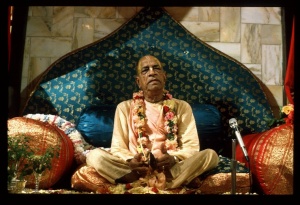SB 5.4.2

A.C. Bhaktivedanta Swami Prabhupada
TEXT 2
- tasya ha vā itthaṁ varṣmaṇā
- varīyasā bṛhac-chlokena caujasā
- balena śriyā yaśasā vīrya-śauryābhyāṁ ca
- pitā ṛṣabha itīdaṁ nāma cakāra
SYNONYMS
tasya — of Him; ha vā — certainly; ittham — thus; varṣmaṇā — by the bodily features; varīyasā — most exalted; bṛhat-ślokena — decorated with all the high qualities described by poets; ca — also; ojasā — by prowess; balena — by strength; śriyā — by beauty; yaśasā — by fame; vīrya-śauryābhyām — by influence and heroism; ca — and; pitā — the father (Mahārāja Nābhi); ṛṣabhaḥ — the best; iti — thus; idam — this; nāma — name; cakāra — gave.
TRANSLATION
When the son of Mahārāja Nābhi became visible, He evinced all good qualities described by the great poets—namely, a well-built body with all the symptoms of the Godhead, prowess, strength, beauty, name, fame, influence and enthusiasm. When the father, Mahārāja Nābhi, saw all these qualities, he thought his son to be the best of human beings or the supreme being. Therefore he gave Him the name Ṛṣabha.
PURPORT
To accept someone as God or an incarnation of God, one must observe the symptoms of God in his body. All the symptoms were found in the body of Mahārāja Nābhi's extraordinarily powerful son. His body was well structured, and He displayed all the transcendental qualities. He showed great influence, and He could control His mind and senses. Consequently He was named Ṛṣabha, which indicates that He was the supreme living being.